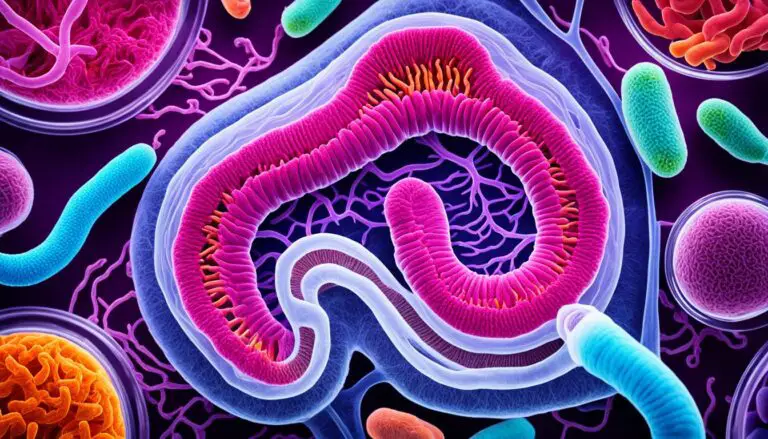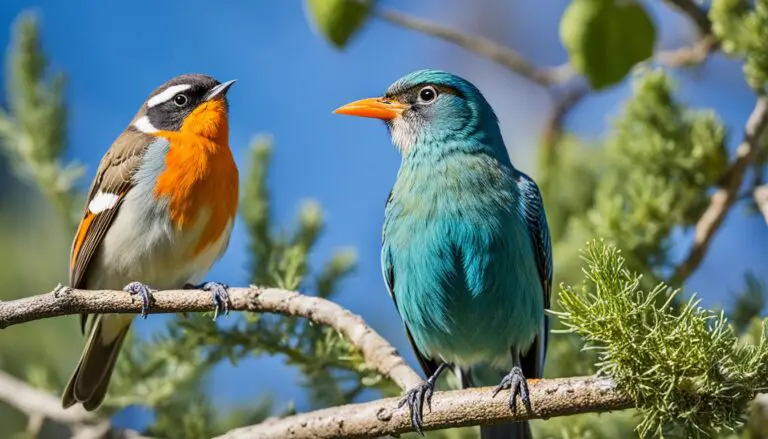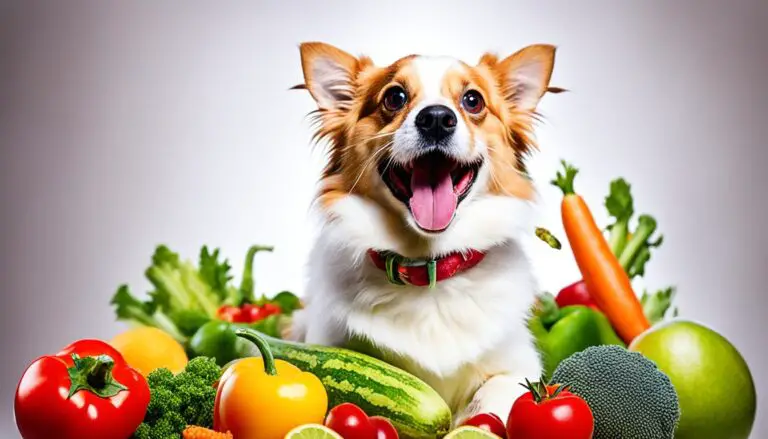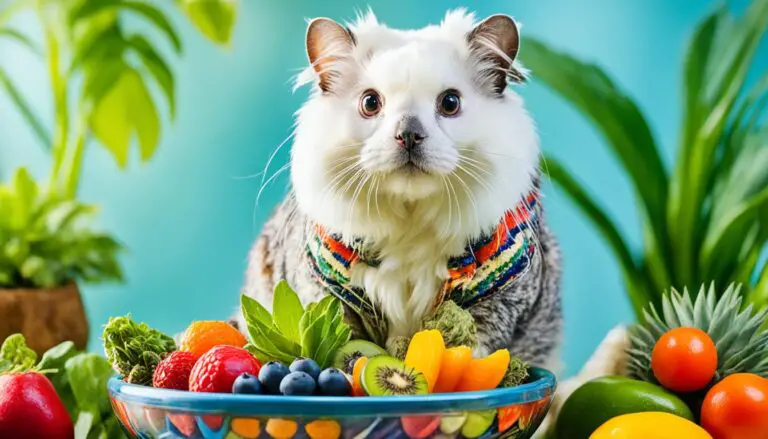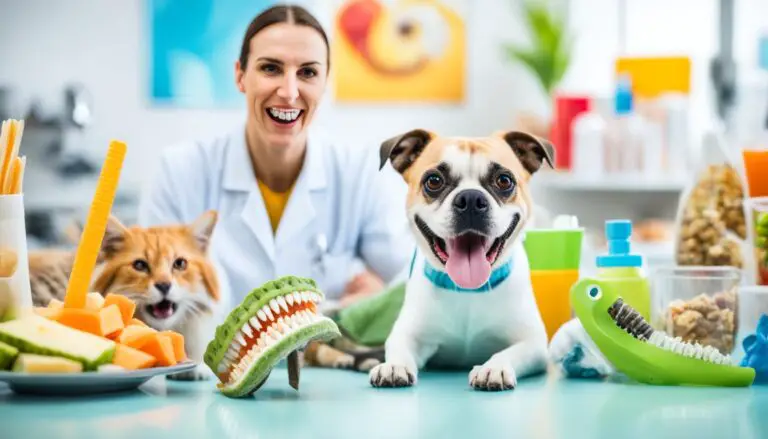Probiotics for Exotic Animals’ Digestive Health
Did you know that exotic animals can benefit from probiotics too? Probiotics are not just for humans and common pets like dogs and cats. They can help a wide range of animals, including those with unique diets. This includes reptiles, birds, and small mammals. Adding probiotics to their diets can improve their digestive and overall health.
Probiotics keep the gut flora balanced in exotic animals. This improves digestion and the absorption of nutrients. A healthy gut is crucial for the animal’s overall well-being. It’s linked to a strong immune system and a healthy brain. Probiotics can help with skin health, regular bowel movements, and positive mental health of your exotic friend.
Key Takeaways:
- Probiotics can benefit exotic animals’ digestive health by maintaining a balanced gut flora.
- A healthy gut is crucial for nutrient absorption, immune function, and overall well-being in exotic pets.
- Probiotics may improve skin health, bowel movements, and mental well-being in exotic animals.
- When choosing probiotics for exotic animals, consider their specific needs and opt for high-quality products.
- Consult with a veterinarian for personalized recommendations and care for your unique pet.
Why Digestive Health is Important for Exotic Animals
Digestive health is key for exotic animals to stay healthy. A good digestive system helps them absorb nutrients and keeps their immune system strong. It also stops digestive issues. These animals have special diets and digestion, making care very important for their health.
Probiotics and digestive enzymes are important for a healthy gut in exotic pets.
Probiotics for Unique Pets:
“By providing them with the right digestive care, we can ensure their well-being and happiness.”
Probiotics are good bacteria that help the stomach stay balanced. They assist the digestive enzymes in the stomach. This makes breaking down nutrients easier.
Exotic Pet Digestive Care:
“Maintaining a healthy digestive system is essential for exotic pets.”
Digestive enzymes help break down food like proteins and fats. They make it easier for the body to absorb nutrients.
Probiotics and enzymes work together. They keep the stomach healthy and help pets avoid digestion problems.

Table: Benefits of Digestive Enzymes and Probiotics for Exotic Animals
| Benefits | Digestive Enzymes | Probiotics |
|---|---|---|
| Improved nutrient absorption | ✓ | ✓ |
| Support for the immune system | ✓ | ✓ |
| Prevention of digestive disorders | ✓ | ✓ |
| Enhanced digestion of proteins, fats, and carbohydrates | ✓ | |
| Optimal gut flora balance | ✓ |
As the table shows, enzymes and probiotics have their own benefits. Enzymes help with nutrient absorption. Probiotics balance gut bacteria for better digestion.
Using probiotics and enzymes in pets’ care routine can greatly improve their digestive health. This helps exotic animals live happily and healthily.
The Benefits of Probiotics for Exotic Animals
Probiotics are great for exotic pets. They help keep the gut healthy. This is key for digesting food and taking in nutrients. They make sure the balance of good bacteria in the gut is right, improving the pets’ health.
The Importance of Gut Health for Exotic Animals
All animals, including exotic pets, need good gut health. A strong digestive system means they can absorb nutrients well. It also helps their immune system work better. Since exotic pets eat special foods and have different digestion, gut health is very important for them.
“A healthy gut is the foundation of a healthy pet.”
Probiotics keep exotic animals’ stomachs healthy by balancing the gut bacteria. They help the pets digest food better. This lowers the chance of stomach problems common in these pets.
The Benefits of Probiotics for Exotic Pets
Probiotics do a lot for exotic animals’ digestion:
- 1. Improved Digestion: They make sure the gut has good bacteria for breaking down food.
- 2. Enhanced Nutrient Absorption: This means exotic pets can get more nutrients from their food.
- 3. Stronger Immune System: A healthy gut boosts the pets’ immune system, helping them resist disease.
- 4. Reduced Risk of Digestive Disorders: They can prevent issues like upset stomachs and diarrhea.
Probiotics for Reptiles and Unique Pets
Reptiles and unique pets get special benefits from probiotics. Living in specific environments can affect their digestion. Probiotics help keep their gut health at its best, even in unique living conditions.

The right gut bacteria, thanks to probiotics, keeps reptiles and other unique pets healthy. It helps with digestion, avoiding problems related to their living environment.
Choosing the Right Probiotic Supplements for Exotic Animals
When choosing probiotic supplements for exotic animals, it’s key to know their needs. Exotic pets like snakes or lizards have different tummies from cats and dogs. So, it’s vital to pick probiotics made for these unique digestive systems.
Search for well-known probiotic brands that cater to exotic animals. These probiotics use helpful strains to boost the gut health of your special pets. This ensures your exotic pets get what they really need.
Always go for probiotics that are backed by solid testing and research for exotic animals. Check the brand’s background and make sure it’s supported by science. This way, you know your pets are getting top-notch digestive care.
Digestive enzymes are also great for exotic pets. They help your pets break down food better, absorbing more key nutrients. This means your unusual pets can get the most out of their meals.
It’s wise to speak with a vet who knows a lot about exotic pets. They can suggest the best probiotic and enzyme mix for your pet.

Choosing the correct probiotics and enzymes boosts your exotic pets’ health. They help keep your pets’ stomachs happy, which is essential for their overall health.
| Benefits of Choosing the Right Probiotic Supplements for Exotic Animals: |
|---|
| 1. Support optimal gut health in non-traditional pets |
| 2. Assist in balancing the gut microbiome |
| 3. Enhance nutrient absorption and digestion |
| 4. Strengthen the immune system of exotic animals |
| 5. Reduce the risk of digestive disorders |
Guidelines for Using Probiotics in Exotic Animals
When using probiotics for exotic animals, it’s key to follow guidelines for the best results. This helps keep your pet’s stomach healthy and them happy.
1. Start with the recommended dosage: Always begin with the right amount for your pet’s size. This means they get the proper probiotics for digesting well.
2. Gradually increase if needed: If your pet needs more, slowly up the dose. A vet can help you find what’s best for your exotic friend.
3. Administer consistently: Giving probiotics at the same time every day helps. It sets a routine and makes the probiotics work their best.
4. Consult with a veterinarian: Talk to a vet before adding probiotics to your pet’s diet. Exotic pets might need special care. A vet can give you the right advice on dosage and use.
Stick to these steps, and your exotic pet will enjoy a healthier gut thanks to probiotics.
| Guidelines for Using Probiotics in Exotic Animals |
|---|
| Start with the recommended dosage based on the animal’s weight. |
| Gradually increase the dosage if needed. |
| Administer the probiotics at the same time each day for consistency. |
| Consult with a veterinarian to determine the best approach for incorporating probiotics into your exotic pet’s care routine. |
Other Factors to Consider for Exotic Animal Digestive Health
Probiotics are key, but there’s more to keeping exotic pets’ digestive health in top shape. It’s vital to look at other factors, too. These steps are critical for the well-being of your special pets.
Nutrition and Hydration
Good nutrition keeps exotic animals’ digestive systems healthy. Make sure their food meets their specific needs and is full of key nutrients. They should eat species-appropriate meals rich in protein, vitamins, and minerals. Plus, always provide clean, fresh water for proper hydration that’s vital for good digestion.
Digestive Enzymes for Exotic Animals
Adding digestive enzymes to your pets’ diet can really help. These enzymes break down food for better absorption. They’re great for sensitive stomachs. Use supplements made for exotic animals to boost their digestion and nutrient intake.
“Digestive enzymes can significantly contribute to the overall gut health and well-being of exotic animals.”
Creating a Stress-Free Environment
Stress is bad for exotic animals’ stomachs. Keep their space calm and peaceful. This means avoiding loud noises and other stress triggers. Offer hiding spots and the right kind of light to keep them relaxed.
Exercise and Activity
Moving around helps keep exotic animals’ digestion in check. Encourage them to act naturally and provide ways for them to stay mentally and physically active. This keeps food moving through their intestines and helps avoid constipation.
| Factors to Consider for Exotic Animal Digestive Health | Benefits |
|---|---|
| Nutrition and Hydration | Supports proper digestion and prevents constipation |
| Digestive Enzymes for Exotic Animals | Aids in nutrient absorption and enhances digestion |
| Creating a Stress-Free Environment | Promotes a healthy gut flora and optimal digestion |
| Exercise and Activity | Stimulates peristalsis and supports overall gut health |
Remember these factors can help your exotic pets’ digestion. But always talk to a vet for advice personalized for your pets.
Probiotics and Mental Health in Exotic Animals
Probiotics are good for the belly and brain of exotic animals. They help keep the gut healthy, which affects the mind too. This health duo leads to happier and more stable pets.
Stress can hurt the gut health of exotic animals, which then impacts their minds. However, probiotics step in to bring balance. They boost good bacteria, helping the gut send out feel-good signals. This makes the animals less stressed and anxious.
Exotic animals that are not digesting well might act out or seem uncomfortable. Probiotics can ease these issues by aiding digestion. They work to keep the gut strong, stopping bad stuff from causing trouble. This keeps the animals’ mood and behavior in check.
Besides helping the mind, probiotics are great for the body too. They make nutrients easier to soak up, boost immunity, and ease tummy troubles. With a happy gut, these animals enjoy a healthier life overall.
The Benefits of Probiotics for Mental Health in Exotic Animals
Probiotics do a lot for exotic animals’ mental health:
- They lower stress and anxiety
- Help keep moods even
- Aid in emotional control
- Boost general well-being
“A healthy gut leads to a healthier mind and a happier, more contented exotic pet.”
Adding probiotics to an exotic animal’s care can do wonders for both body and mind. Always ask a vet for advice on the best probiotics and how much to give to your special pet.
Safety and Precautions when Using Probiotics in Exotic Animals
Probiotics help keep the stomach healthy in exotic pets. But, we must be careful when using them. Always ask a vet who knows about unusual pets before giving probiotics. They can give advice that fits your pet’s needs.
Especially if your pet is very sick, gets tired easily, or has a weak immune system. For these pets, too many probiotics might not be good. A vet can tell you if probiotics are right and how much to give.
Choose probiotics that are made for uncommon animals and have been tested. These are safe and work well for different pets. This helps your pet’s stomach to be healthy without bad effects.
Use probiotics as the vet or label says. Too much can upset your pet’s stomach. Watch for any changes in how your pet acts or what they eat. If something seems wrong, talk to your vet right away.
Summary of Safety and Precautions when Using Probiotics in Exotic Animals:
- Always talk to a vet who is good with rare pets before giving probiotics.
- If your pet’s immune system is not strong, probiotics might be risky. A vet can help you decide.
- Pick probiotics that are safe and effective, especially made for unusual pets.
- Give the right amount of probiotics as your vet or the label suggests.
- Keep an eye on your pet for any bad reactions. And tell the vet if you see something.
Expert Quote:
“The safety and benefit of exotic animal probiotics are key. Talking to an expert vet is the best way to choose what’s right for your pet.” – Dr. Sarah Lopez, DVM
| Common Safety and Precautions when Using Probiotics in Exotic Animals | Why It’s Important |
|---|---|
| Consultation with a veterinarian | A veterinarian can provide personalized advice and address any specific health concerns or considerations related to using probiotics in your exotic pet. |
| Assessment of immune status | Pets with compromised immune systems may be at higher risk of adverse reactions. Understanding their immune status helps in evaluating the strain and dosage of probiotics. |
| Choosing tested and proven products | High-quality probiotic supplements are formulated with the unique needs of exotic pets in mind, ensuring their safety and effectiveness. |
| Following recommended dosage | Proper dosage is essential to prevent imbalances in the digestive system and potential adverse reactions. |
| Monitoring for adverse reactions | Regular observation allows for early detection of any negative effects and prompt veterinary intervention if necessary. |
Conditions that May Benefit from Probiotic Treatment in Exotic Animals
Probiotics help keep the stomachs of exotic animals healthy. They also treat many problems these pets might get. Adding probiotics to their routine could make a big difference for animals facing issues like:
- Allergies
- Anxiety
- Bad breath
- Coat quality issues
- Diarrhea
- Immune disorders
- Intestinal inflammation
- Irritable bowel syndrome
- Liver disease
- Obesity
- Skin disorders
- Urinary tract infections
Does your exotic pet have any of these problems? Talking to a vet about probiotics may be a good idea. They can recommend the right supplements. This ensures your pet’s gut health and happiness.
Case Study:
Terry, the hedgehog, had really bad skin problems. His owner Emily, tried many things that didn’t work. Their vet suggested probiotics. Not long after Terry started taking them, his skin got better and he got fewer infections. This shows how much probiotics can help treat skin issues in exotic pets.
Conclusion
Probiotics are very important for the digestive health of exotic animals. They are crucial to keep the gut bacteria balanced and the immune system strong. This helps prevent problems with digestion.
When choosing probiotic supplements for your exotic pet, pick high-quality ones. Think about what your pet needs specifically.
It’s also vital to follow the advice on how to give probiotics. Don’t forget about the importance of good food and mental health. These factors help your pet’s digestion.
Always talk to a vet for professional advice. With the right care, including probiotics, your exotic pet will be healthy and happy for years.
FAQ
Are probiotics beneficial for exotic animals’ digestive health?
Why is digestive health important for exotic animals?
What are the benefits of probiotics for exotic animals?
How do I choose the right probiotic supplements for my exotic animals?
What guidelines should I follow when using probiotics in exotic animals?
What other factors should I consider for my exotic animal’s digestive health?
Can probiotics help with mental health in exotic animals?
Are probiotics safe for use in exotic animals?
What conditions can be managed with probiotics in exotic animals?
How do probiotics support exotic animals’ digestive health?
Source Links
- https://www.drharveys.com/products/dogs/466-digestive-probiotics-soft-chews
- https://www.onlynaturalpet.com/products/only-natural-pet-complete-gut-health-complex-probiotics-digestive-enzymes-for-dogs-cats
- https://www.vet.cornell.edu/departments-centers-and-institutes/riney-canine-health-center/health-info/power-probiotics
Peter Stones is the founder of Exotic Pets Place, the leading online resource for exotic pet care information.
With over 10 years of hands-on exotic pet ownership experience, he is deeply passionate about sharing his expertise to help others properly care for their unusual pets.
When he's not writing extensively researched articles or connecting with fellow exotic pet enthusiasts worldwide, you can find Peter at home tending to his own beloved menagerie of exotic animals.



